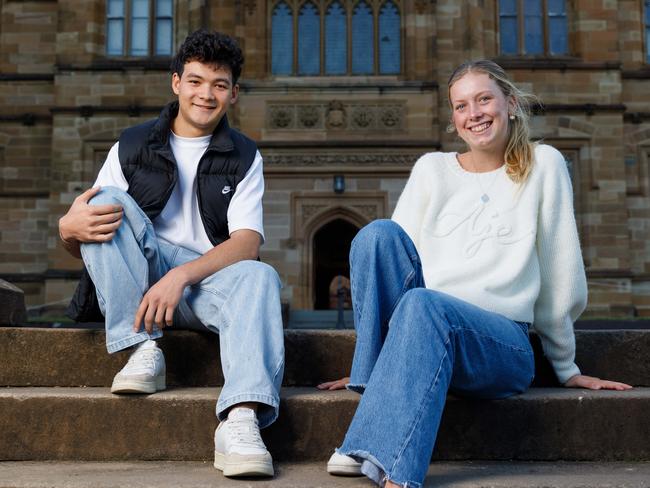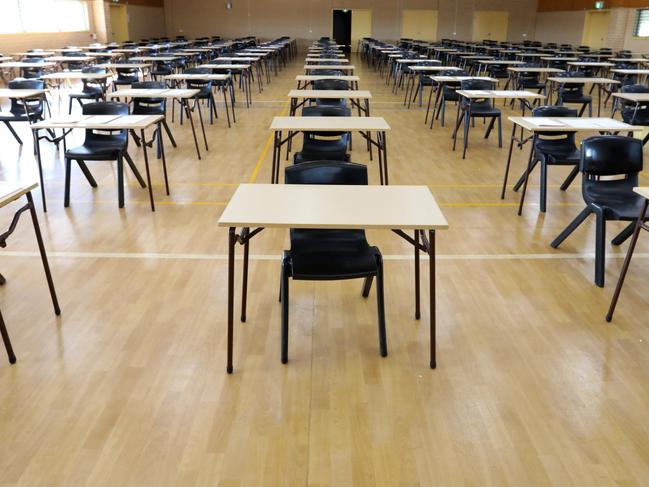HSC English 2024: Two things every Paper 1 and 2 exam marker is looking for
Whether you’re a STEM specialist anxious about creative writing or an expert essayist looking to eke out a few more marks in the final exam, The Daily Telegraph’s guide covers all the tips, tricks and truth behind the myths for English Papers 1 and 2.
Education
Don't miss out on the headlines from Education. Followed categories will be added to My News.
The 2024 HSC exam period will begin with every one of the state’s 76,000 Year 12 students sitting down for two consecutive two-hour tests of their skills in NSW’s only mandatory subject, English.
Whether you’re a STEM specialist anxious about creative writing or an expert essayist looking to eke out a few more marks in the final exam, The Daily Telegraph’s guide covers all the tips, tricks and truth behind the myths for English Papers 1 and 2.
University student and tutor Nicholas Bradshaw topped the state in the standard English course in 2023, and says the unexpected result came from finding his “passion” within the subject – and for learning in general.
“I actually despised English, previously, and that was my main struggle in Year 11 and 12. I was very much a maths and science type of person,” he said.
“Taking a different perspective towards English makes it must more interesting and enjoyable.”

WHAT MARKERS WANT
Dr Selina Samuels, a former HSC English marker and education expert at Cluey Learning, stressed that the NSW Education Standards Authority (NESA) uses a “positive marking framework” to score the HSC.

“Teachers want to give marks, they’re looking for opportunities to award them, not opportunities to take them away,” she said.
Markers are looking, primarily, for two things, Dr Samuels said: Knowledge of the text, and skills of expression.
“Is this a student who’s done the work, knows the texts, and understands the curriculum requirements? Is this a student who can actually write and express themselves, and explain themselves?”
Top-ranked English student Nicholas Bradshaw said finding a way to connect with your set texts at a personal level cannot only help motivate your studies, but can also keep your marker engaged and interested in your work.
“I was always writing about things that I actually wanted to spread the word and talk about,” he said.
“My favourite essay by far was on The Truman Show – I talked about how modern society consumes a lot of media and we’re living our lives through other people.

“I tried to relate it to my own life or those around me as much as I could, and I think there’s a lot of value in that not only for yourself, but also for the person reading the essay.”
DR SAMUELS BUSTS MARKING MYTHS
Does it matter if I can’t remember an exact quote for each argument in my essay? “It’s best if you can quote, and for that quote to be as accurate as possible, but if you cannot remember a direct quote to make reference to a specific point in the text, you can make reference to a technique that’s been used by the write. You can paraphrase – but don’t use quotes or references to the text to prove the plot because that’s pointless. Don’t just plonk the reference and leave it sitting there for the examiner to say ‘so what?’”

Can I write in first person/make personal references in my essays? “Yes, as long as it also demonstrates that you’ve read the text and you’re not just waffling about how relatable it is for you. The syllabus actually talks about student connection (with) and personal response to texts, particularly in Module B. When we talk about ‘context’ – another buzzword in the syllabus – we’re talking about the writer’s context, but we’re also asking students to reflect on their own context. For example, what is it to study Shakespeare, when you’re a young person in the 21st century?”

NEXT STEPS TO STUDY UP
• Tip 1: Re-write essays to past paper questions – and do lots of them. “In the exam, if you’re given any type of question, you’re then able to adapt your essay in any way,” Mr Bradshaw said. The former top student recommends starting with at least five essays a week in the first phase of study, ramping up to two or three essays per day in the immediate lead-up to the HSC.

• Tip 2: Don’t aim for perfection – you’ll waste your time in the process. “I always used to get stuck on trying to write the perfect sentence for the perfect essay, and it would take me two-plus hours to write one essay,” Mr Bradshaw said. “Eventually you’ll need to be able to write them in 40 minutes.”
• Tip 3: Don’t waste time memorising and rewriting long quotes. Dr Samuels said this is “just a waste of time” when shorter extracts can just as easily prove your point.
• Tip 4: Keep asking yourself “So what”. Dr Samuels instructs all her students to write those two words on a poster and pin it above their desk, and reflect constantly on whether what they’re writing would tell a marker something they don’t already know. “It’s a very important way to remind yourself to stay on point,” she said.
• Tip 5: Get the gang together for group study. “Discussing the texts with others, and the concepts you’ve studied, teaching others and being active in your learning is really important now,” Dr Samuels said. “If you teach it to others, it’s fresher for you, and it’s about pooling your resources – you’re not competing with your classmates anymore, you want everyone to do well.”
TAKING THE TEST – AND NAILING IT
Paper 1 – Texts and Human Experience
If there’s one thing about the 2024 Paper 1 English exam that can be predicted, it’s that the stimulus book will include at least one poem.
Selina Samuels said the exam’s contents follow a “familiar pattern” every year, and students can be “pretty confident” they’ll be confronted with a poem, a prose extract, and likely a visual stimulus too.
Dr Samuels said there are a “series of skills” any student can learn and apply to ace the first section of paper one – short responses to those unseen texts – and practice absolutely makes perfect, so ask your teachers for copies of past exams papers that include the sample text.

“You need to make sure that you follow the guide as to how many marks each question attracts – if it’s worth two marks, you must make two points. You’re not making five points, because you’ve then just wasted three,” she said.
“It’s important that you’re not just making observations about what happens in the text, but that you are making observations about the choices that they writers have made – why did they choose that particular kind of language? Even if you feel that you don’t really understand the technical language, always think about the audience – who is this intended for? What is it intending to do? What is the purpose of this text?”
Top-ranked graduate Mr Bradshaw recommended students look at the questions first, during reading time, before jumping back into the text extracts.
“Then you can go through the text knowing what you’re looking for,” he explained.
Paper 2 – Modules
In the second exam, students in both the Standard and Advanced courses will compose three extended responses based on each of the three ‘modules’ – Language, Identity and Culture and Close Study of Literature in the standard stream, Textual Conversations and Critical Study of Literature in the advanced stream, and the Craft of Writing unit common to both.

While some tutors preach a full-marks “formula” for essay length, Nicholas Bradshaw said the English exams are about quality over quantity. Despite writing less in his tests than many of his peers, Mr Bradshaw’s filler-free essays bested them all.
“If you know you’re not someone who can write nine pages in 40 minutes, then you don’t need to do it – you can fit enough quality within a smaller amount of words,” he said.
“Every single sentence should have a purpose and a meaning, so that if the sentence was taken out it wouldn’t make sense anymore.”



